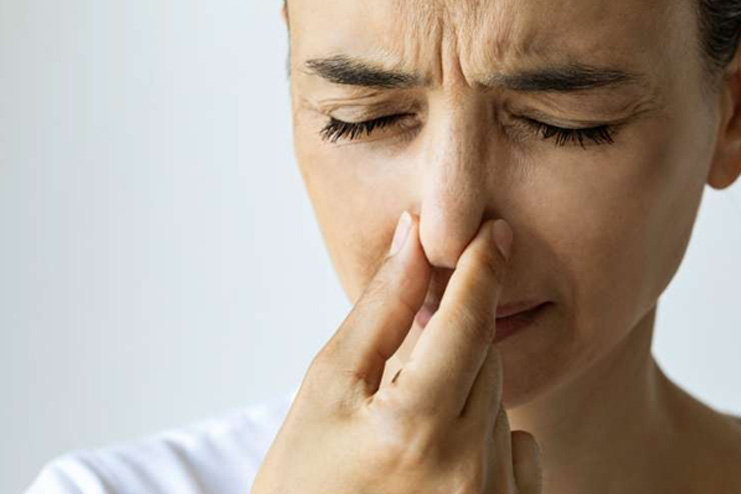AI Contribution
At HealthSpectra, we may use AI to refine grammar and structure, but every piece is shaped, checked, and approved by real people, our expert writers and editors, to ensure clarity, credibility, and care. Learn more..Affiliate Disclaimer
Some links in this article are affiliate links. We may earn a small commission if you make a purchase through these links, at no extra cost to you. We only recommend products we find useful to our readersA tiny, apparently unimportant feature of your body, the belly button, may hide an unpleasant truth. Sometimes, it surprises us with a bad smell for something we don’t think about much. However, why does this occur? Your navel is a magnet for sweat, bacteria, and dirt, making it the ideal place for foul odors.
Ignoring it might result in infections, other skin problems, and uncomfortable situations. Maintaining good hygiene is essential for your health as well as your appearance. Let’s dive into the causes and solutions for this overlooked issue.
Why does my belly button stink after cleaning it every few hours?
There are ample reasons that can lead to belly button stinks, which must be identified to treat effectively. The belly button smells terrible because it mostly stays covered. Sweat, infections, and medical conditions also contribute to the foul and displeasing odor.
Poor cleaning and washing of the belly button area can cause bacterial infections. These cause yellowish-brown discharge, adding to pain, discomfort, and itchiness. It can be prominent if you see a lot of sweat around the navel area.
Fungal infections can occur because the belly button is a perfect breeding ground for all sorts of infections. It is dark and damp, mostly stays warm, and is not cleaned that frequently. These may cause redness and itchiness, in addition to bad odor.
Why Does the Belly Button Stink Without Bacteria or Fungal Infection?

Conditions like diabetes and pregnancy can also contribute to a smelly belly button. For instance, belly button odor can become more noticeable during the third trimester of pregnancy. Diabetes weakens the body’s ability to fight infections, which can be slow to heal and may result in a foul smell, similar to spoiled cheese or rotten fish.
During pregnancy, there are ample hormonal and other bodily changes in addition to physical, emotional, and biological transformations. The hormones trigger metabolic activities to high levels and cause increased perspiration. This extra sweat accumulates around the belly button and causes a foul odor.
Causes of Smelly Belly Button

The smell from your navel is not a severe cause of worry, though the smell from your belly button causes immense discomfort and makes you self-conscious. Let us understand the causes of belly button smell:
1. Dirt or Debris in the Inward Belly Button Area:
The area around the belly button may smell bad due to sweat and dirt accumulation. If ignored, this could result in an infection that becomes worse over time and makes the navel smell like waste products. Proper cleaning and hygiene are crucial to avoid this unpleasant and preventable problem.
2. Infection by Yeast:
An overabundance of the yeast (or fungus) Candida might cause a fungal infection that makes your belly button smell musty or nasty. The belly button contains naturally occurring yeast, which is typically harmless, just like the skin on the rest of your body. However, a skin yeast infection in the folds of your navel may result from an overabundance of yeast in the belly button.
3. The Navel Stone:
A navel stone is an uncommon, stone-like mass composed of keratin (skin protein) and sebum (oil) in the belly button. Other names for the stone include umbilith and omphalolith. The development of navel stones is more common in those with deep belly buttons and those who struggle to keep them clean. Melanin, a skin pigment, gives navel stones their typical brownish-black appearance as keratin and sebum build up and solidify in the belly button.
4. Inflammations:
Skin inflammation around the belly button is joint, and anaerobic bacteria can lead to infections that spread a strong, unpleasant odor. To avoid these problems and preserve the belly button odor-free, practice proper cleanliness and quickly treat irritation.
5. Cysts:
The development of a cyst behind your belly button is possible. An infection of this cyst may result in discomfort, discharge, and an unpleasant odor. A tiny sac of tissue called a urachal cyst forms in the space between the bladder and the belly button. In a developing fetus, this structure—the urachus—connects the bladder to the belly button. Although it usually goes away before the baby is born, some people still have it.
Home Remedies for Smelly Belly Button

There are natural remedies you may do at home to address the issue of belly button stink, so don’t panic if it’s making you wrinkle your nose. Here are some practical ways to make things more fresh:
Tea Tree Oil
When it comes to navel odor, this all-natural antibacterial powerhouse is revolutionary. Using a cotton swab, gently dab a few drops of tea tree oil onto your belly button after mixing it with a carrier oil, such as coconut or olive oil. Before you rinse it off, let it sit for ten minutes. It leaves a pleasant aroma while aiding in the destruction of microorganisms.
Rinse with Salt Water
A simple saltwater solution can clean and relieve inflammation. Dissolve 1 teaspoon of salt in warm water to naturally lessen odor and irritation, and gently rinse your belly button.
Apple Cider Vinegar
Apple cider vinegar is a pH-balancing miracle that combats microorganisms that cause odors. Wipe the navel with a cotton ball after combining equal parts water and apple cider vinegar. In addition to eliminating the odor, it guards against infections.
Treatment for Belly Button Smell
- Doctors must perform surgery to rectify the problem of patent urachus. It will help eliminate the infection-causing odor.
- Apply anti-fungal creams to eliminate fungal or yeast infections in the navel area.
- You can use antibacterial creams to clear the area of bacterial infections.
Steps For Cleaning Belly Button
- Collect all the supplies like water, hydrogen peroxide, rubbing alcohol, baby oil, and body wash
- Use a cotton swab to dip in any of the above solutions
- Now gently swirl the cotton swab around your navel region in circular motions
- Use a dry Q-tip to wipe it clean
- In addition, you may apply a warm compress and leave it for minutes to clear off the infection and itchiness
- Use antibacterial cream or anti-fungal cream every night until the infection clears
- Use your fingertip to clean belly button every time you take a shower
Prevention Tips for Belly Button Odor

It’s easy to avoid belly button stink. You may maintain your navel’s cleanliness, freshness, and odor-free nature by implementing a few conscious routines. Here’s how:
Maintain a Regular Hygiene Schedule:
You should consider your belly button like the rest of your body. Wash it with mild soap and water every day, being careful to dry it thoroughly. For more thorough cleaning, use a cotton swab soaked in warm water or a mild cleaner. Frequent maintenance halts the spread of dirt and bacteria.
Choose Breathable Fabrics:
Your attire can have a significant impact. Choose materials that let your skin breathe, such as cotton or moisture-wicking fibers. By reducing perspiration, these textiles lessen the ideal environment for growing bacteria.
Don’t Skip Post-Workout Cleaning:
One of the primary causes of belly button odor is sweat. After working out, make sure to take a quick shower and clean your navel. This practice keeps sweat and dirt from lingering, avoiding odors and potential diseases.
Avoid Harsh Chemicals:
The sensitive skin surrounding your navel may be irritated by harsh soaps or scented items. Stick to mild, fragrance-free products to prevent redness, irritation, or responses that could worsen odor problems.
Conclusion
Even though your belly button is a small area of your body, it is essential to keep it clean. Maintaining good hygiene shields you from diseases and discomfort and avoids offensive odors. As part of your self-care regimen, clean your navel regularly. Look for any odd symptoms, such as inflammation or lingering odors.
Feel free to see a doctor if you experience worsening symptoms or if home cures are ineffective. Your navel will remain fresh, healthy, and worry-free with a bit of attention. Take charge, and let your confidence shine!
Share ahead and keep writing us, we love hearing from you!
-
May 2017Written by Minu Manisha
-
Nov 2024Edited by Ankita
References
- https://www.medicalnewstoday.com/articles/320706#type-of-odor
- https://www.health.com/why-does-my-belly-button-smell-8550932
- https://my.clevelandclinic.org/health/diseases/22909-belly-button-yeast-infection
- https://www.verywellhealth.com/why-does-my-belly-button-smell-5214515
- https://share.upmc.com/2015/07/how-to-keep-your-bellybutton-navel-clean-the-right-way
- https://www.health.com/discharge-from-belly-button-8620529
- https://www.medicalnewstoday.com/articles/320706
In this Article






















